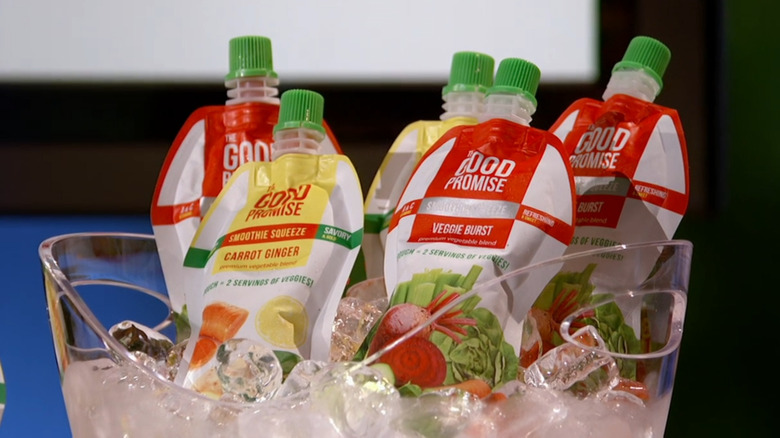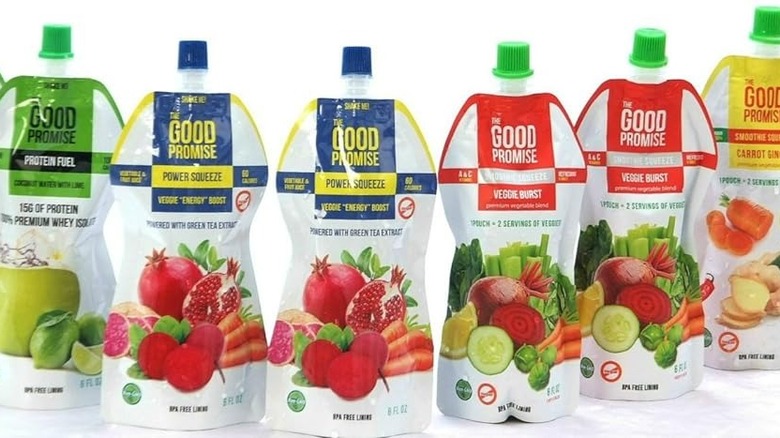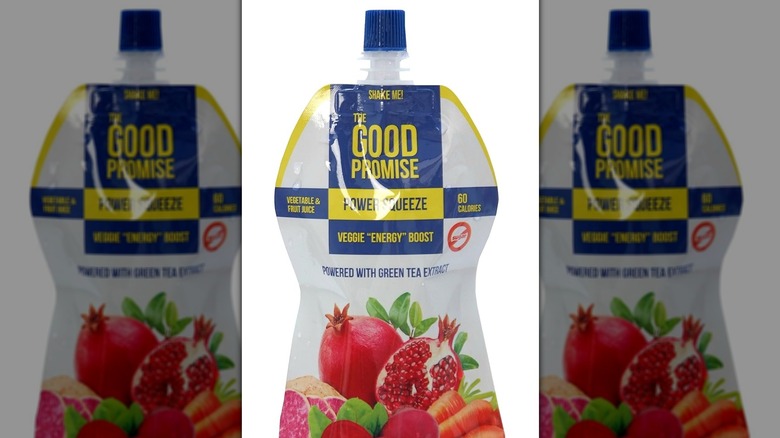The Good Promise: Here's What Happened After Shark Tank
We may receive a commission on purchases made from links.
Before Karen Posada created The Good Promise, a beverage company focused on selling affordable vegetable smoothies, she worked as a journalist in Austin, Texas. In 2012, she sat down with her mother to tell her that she wanted to leave the news industry and enter entrepreneurship to spend more time with her son. After some deliberation and a $50,000 donation from her parent, Posada came up with a vegetable-enriched pasta sauce that would eventually land on Walmart's shelves. She didn't give up on her dream after those products underperformed and shifted focus to create a line of veggie juice pouches instead.
Those portable smoothies would lead Posada to further success, landing her a spotlight on the Wall Street Journal before her new product even hit the shelves. Shortly after negotiating another retail deal with Walmart for the juice pouches, the entrepreneur received the news that her company had gotten approved to appear on "Shark Tank." Posada accepted the offer and stepped in front of the Sharks on season 7, episode 22, hopeful that the Sharks would love her product.
What happened to The Good Promise on Shark Tank?
During her "Shark Tank" debut, Karen Posada sought $100,000 for a 20% stake in her company. Posada took no time in presenting her product to the judges, bringing in a variety of sampled smoothie flavors for the Sharks to try. The Sharks immediately had a mixed reaction to the blends, with Kevin O'Leary going as far as to liken them to dumping waste. Lori Greiner was the first to back out, citing that she found the smoothies difficult to get down. Robert Herjavec did not offer a deal for the same reason — although he complimented Posada for having a distributor already.
Daymond John saw some positives in the divisive flavor of The Good Promise, noting that the flavor could ultimately play a part in the marketing of the product. However, the Shark ultimately backed out because he felt the blends for The Good Promise didn't fit the tastes of the cold-pressed juice market. Meanwhile, O'Leary did not hold back on his feedback for The Good Promise before announcing that he would not make a deal, comparing the smoothies to uncleaned escargot.
Posada was soon left to negotiate with Mark Cuban, the long-time judge who's slated to leave "Shark Tank" after Season 16. He ultimately backed out as well due to The Good Promise's unfocused marketing, leaving Posada with no deal as she walked off the show's set.
The Good Promise after Shark Tank
Karen Posada's company did not receive a warm welcome from "Shark Tank" fans after the episode aired. In an interview with Derek Champagne, founder and CEO of The Artist Evolution, the entrepreneur admitted that she received about 1,000 emails that were filled with hateful messages. But even amid all the negative feedback and publicity, Posada still got to experience the lucrative "Shark Tank effect," a term that describes the large boost of sales a company receives shortly after appearing on the show. On the weekend that the episode aired, The Good Promise received approximately 3,000 orders and 50,000 website visits.
Online, Posada's products have received glowing reviews. On Amazon, one user admitted that they were "obsessed with them," as another noted that they had replaced their afternoon coffees with one of the beverages. That small commercial and customer satisfaction success alone puts The Good Promise higher than other Shark Tank beverage companies that tanked in both sales and public reception, like the infamous Cougar Energy.
Why did The Good Promise go out of business?
Unfortunately, Karen Posada's health-conscious beverages did not survive the competitive food market. In 2016, she ultimately filed her company as out-of-business — the same year her episode on Shark Tank aired on TV. Like other unsuccessful beverage companies that appeared on Shark Tank, such as Luma Soda, it appears that the publicity that came with the show did not do enough to save Posada's business.
The immediate jump to national retail stores appears to be part of the reason why The Good Promise didn't survive for long. Even with the continued support from Walmart, distribution costs played a large part in why Posada never saw a sizable return from her investment even before her appearance on Shark Tank. It also didn't help that there were multiple successful cold-pressed juice bottles that were relatively affordable and easily available at most retail grocery chains, making the possibility of a comeback even slimmer for The Good Promise.
What's next for The Good Promise's founder?
Karen Posada appears to have moved on from entrepreneurship altogether. Her Facebook page reveals that she now works as a senior staff engineering manager for PayPal, and she has not made any recent announcements online planning on reviving the company. In fact, the former business owner hasn't made any posts on her social media account since 2020, making it difficult to gauge exactly where she currently stands — or if she has moved on to another company.
As for The Good Promise, it appears to have almost vanished from the Internet. Its website no longer leads consumers to a working homepage, and the company appears to have deleted its entire presence on social media. The Good Promise products are no longer stocked on Amazon, and it looks like there is no way to purchase them through any other online or retail supplier. This might be devastating for devout fans of the company's beverages or pasta sauces, or even viewers who are now interested in tasting their items. On the brighter side, there are now plenty of delicious vegetable juices (and even veggie-loaded pasta sauces) for consumers to try instead.





